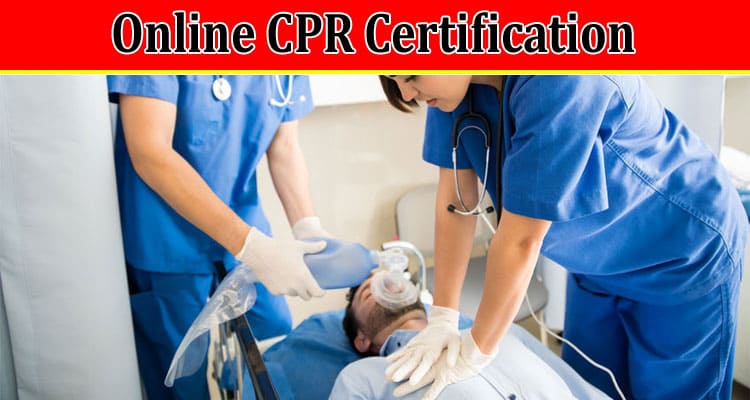Cardiopulmonary resuscitation (CPR) is a life-saving skill that every healthcare professional should possess. In a healthcare setting, emergencies can happen at any moment, and having CPR certification means you are prepared to respond effectively. Whether it’s reviving a patient in cardiac arrest or providing critical aid until advanced medical help arrives, CPR can make a significant difference in patient outcomes.
The Convenience of Online CPR Certification
Traditional CPR certification courses often demand a significant time commitment. Healthcare professionals working long shifts might find it challenging to fit these courses into their schedules. Online CPR certification, on the other hand, offers flexibility. You can access course materials and complete training modules at your convenience, allowing you to balance your professional responsibilities with your certification goals.
Understanding CPR Certification
What is CPR?
CPR is a life-saving technique involving chest compressions and rescue breaths. It is administered to individuals experiencing cardiac arrest or respiratory failure. Understanding the fundamentals of CPR, including hand placement, compression depth, and breath-to-compression ratios, is essential for providing effective assistance.
Why Do Healthcare Professionals Need CPR Certification?
Healthcare professionals often work in high-stress environments where patients’ lives hang in the balance. CPR certification ensures that they have the knowledge and skills necessary to respond immediately to emergencies. It instills confidence and competence, vital attributes in the healthcare field.
Different Types of CPR Certification
Depending on your role and responsibilities in healthcare, different certification levels may be required. Basic Life Support (BLS) is typically essential for all healthcare providers, while Advanced Cardiovascular Life Support (ACLS) and Pediatric Advanced Life Support (PALS) might be necessary for more specialized roles. Understanding these distinctions helps you choose the right certification.
Benefits of Online CPR Certification
-
Accessibility and Flexibility
Online CPR certification offers accessibility, allowing you to access course materials from anywhere with an internet connection. This means you can complete your training at home, at work, or even on the go, making it suitable for healthcare professionals with busy schedules.
-
Self-Paced Learning
Online courses enable self-paced learning, catering to various learning styles and individual progress rates. You can revisit challenging topics, spend extra time practicing skills, and move forward when you feel confident, ensuring a deep understanding of CPR techniques.
-
Cost-Effective Options
Traditional in-person CPR courses often come with hidden costs such as travel expenses and time off work. Online certification providers typically offer more cost-effective options, allowing healthcare professionals to acquire or renew their certification without breaking the bank.
-
Accreditation and Certification Recognition
Reputable online CPR certification providers adhere to national and international guidelines, ensuring that their certifications are recognized by healthcare institutions and employers. This recognition assures healthcare professionals that their online certification is legitimate and widely accepted.
How Online CPR Certification Works
Choosing a Reputable Online CPR Certification Provider
It’s crucial to research and select a reputable provider. Look for certifications backed by organizations like the American Heart Association (AHA) or the American Red Cross. Check customer reviews and ratings to gauge the quality of the provider’s courses and support.
Registration and Course Selection
The process usually begins with registration, followed by selecting the appropriate CPR certification level based on your role and responsibilities. Ensure that the chosen course aligns with your professional needs.
Course Content and Modules
Online CPR courses cover essential topics such as adult and pediatric CPR, AED usage, and choking relief. The content is typically broken down into modules, allowing you to learn step-by-step.
Assessments and Testing
Online courses evaluate your knowledge through quizzes, exams, and practical assessments. These assessments are designed to ensure you understand and can apply CPR techniques correctly.
Certification Issuance
Upon successful completion of the course and passing the required assessments, healthcare professionals receive a digital certification card or a physical copy. This certification demonstrates your competence in CPR.
What to Look for in an Online CPR Certification Course
Course Content and Curriculum
A comprehensive course should cover the latest CPR guidelines, including any updates or changes. It should include hands-on practice and simulations to reinforce your skills.
Instructor Qualifications and Support
Ensure that the online course provides access to qualified instructors or support staff who can answer your questions and provide guidance throughout the certification process.
Course Duration and Access Period
Consider the duration of the course and the access period. Some online CPR courses allow you to revisit materials and practice skills for an extended period, which can be valuable for ongoing skill development.
Certification Validity and Renewal
Understand the validity period of your certification and the process for renewal. Many certifications require renewal every two years to ensure that healthcare professionals stay up-to-date with the latest techniques and guidelines.
Tips for Success in Online CPR Certification
Setting Realistic Goals
Set achievable goals and milestones to keep yourself motivated throughout the certification process. This can help you stay on track and complete your certification successfully.
Creating a Study Schedule
Time management is essential when balancing certification with work responsibilities. Create a study schedule that fits into your daily routine, allocating dedicated time for learning and practice.
Practicing Hands-On Skills
While online courses provide valuable theoretical knowledge, hands-on practice is equally important. Find opportunities to practice CPR skills with manikins or in simulated scenarios to reinforce your proficiency.
Seeking Additional Resources
Don’t hesitate to explore supplementary materials, such as instructional videos, interactive simulations, or online forums where you can connect with other healthcare professionals. These resources can enhance your understanding and skills.
Common Challenges and How to Overcome Them
Time Management
Healthcare professionals often have demanding schedules. To overcome time management challenges, prioritize your certification goals, and create a study plan that fits around your work shifts. Use breaks and downtime for study sessions.
Balancing Work and Certification
Balancing professional responsibilities and certification requirements can be challenging. Communicate your certification goals with your workplace and seek support and understanding from supervisors and colleagues.
Technical Issues
Online courses can sometimes encounter technical glitches. To mitigate these issues, ensure you have a stable internet connection, update your browser and software, and have a backup plan in case of technical difficulties.
The Future of CPR Certification for Healthcare Professionals
Emerging Trends in Online Education
The future of online CPR certification may involve innovative technologies like virtual reality simulations, which can provide a more immersive and realistic training experience. Continuous advancements aim to make online education even more engaging and effective.
Continuous Learning and Skill Enhancement
Healthcare professionals should recognize that CPR guidelines and techniques evolve over time. To stay at the forefront of their field, they must embrace continuous learning and seek opportunities for skill enhancement through ongoing education and certification.
Conclusion
Recap of the Importance of CPR Certification
To summarize, CPR certification is a vital skill for healthcare professionals, enabling them to save lives in critical situations. Online CPR certification offers convenience and flexibility, making it accessible to busy healthcare workers.
The Convenience and Advantages of Online Certification
Online CPR certification provides healthcare professionals with a flexible, cost-effective, and recognized way to acquire and maintain this essential skill. It ensures that healthcare providers are well-prepared to respond effectively in emergencies.
Encouragement for Healthcare Professionals to Pursue Online CPR Certification for Ongoing Professional Development
In closing, healthcare professionals are encouraged to take advantage of online CPR certification as a means of ongoing professional development. By staying certified and continually improving their skills, they not only enhance their careers but also contribute to better patient outcomes and safer healthcare environments.





